Building Bridges, The Challenge of Being In-Between—Kendra Weddle, Letha Dawson Scanzoni, and Jann Aldredge-Clanton
 It was an honor to join Letha Dawson Scanzoni and Kendra Weddle in a presentation titled “Building Bridges, The Challenge of Being In-Between” at the Christian Feminism Today Gathering. The theme of the Gathering was “Standing Up, Speaking Up in Such a Time as This,” based on Esther 4:14. Drawing from our new book Building Bridges: Letha Dawson Scanzoni and Friends, Kendra and I highlighted some of Letha’s work, showing how much it’s needed in our world today. As in the book, we also included excerpts from stories of people whose lives she has transformed through her writing, mentoring, and leadership of Evangelical & Ecumenical Women’s Caucus-Christian Feminism Today (EEWC-CFT), an organization she co-founded. Then Letha gave us her words of wisdom for “such a time as this.”
It was an honor to join Letha Dawson Scanzoni and Kendra Weddle in a presentation titled “Building Bridges, The Challenge of Being In-Between” at the Christian Feminism Today Gathering. The theme of the Gathering was “Standing Up, Speaking Up in Such a Time as This,” based on Esther 4:14. Drawing from our new book Building Bridges: Letha Dawson Scanzoni and Friends, Kendra and I highlighted some of Letha’s work, showing how much it’s needed in our world today. As in the book, we also included excerpts from stories of people whose lives she has transformed through her writing, mentoring, and leadership of Evangelical & Ecumenical Women’s Caucus-Christian Feminism Today (EEWC-CFT), an organization she co-founded. Then Letha gave us her words of wisdom for “such a time as this.”
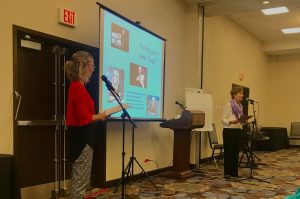 Kendra and I connected the work of Letha and EEWC-CFT to the current “Me Too,” “Church Too,” and “Time’s Up” movements. These movements confirm all the justice work Letha and EEWC-CFT have been doing for decades, creating a viable way forward for women who are now waking up to sexist realities all around us, including in our churches. Many are now speaking up and resisting patriarchal structures, like exclusively male leadership and language in churches, that form a foundation for abuse and violence against women. But we didn’t get here without someone doing the spade work, digging in the biblical narratives to apply the liberating message of Jesus to women and others who have been marginalized. That work was accomplished in large part by Letha Dawson Scanzoni in collaboration with others like Nancy Hardesty and Virginia Ramey Mollenkott.
Kendra and I connected the work of Letha and EEWC-CFT to the current “Me Too,” “Church Too,” and “Time’s Up” movements. These movements confirm all the justice work Letha and EEWC-CFT have been doing for decades, creating a viable way forward for women who are now waking up to sexist realities all around us, including in our churches. Many are now speaking up and resisting patriarchal structures, like exclusively male leadership and language in churches, that form a foundation for abuse and violence against women. But we didn’t get here without someone doing the spade work, digging in the biblical narratives to apply the liberating message of Jesus to women and others who have been marginalized. That work was accomplished in large part by Letha Dawson Scanzoni in collaboration with others like Nancy Hardesty and Virginia Ramey Mollenkott.
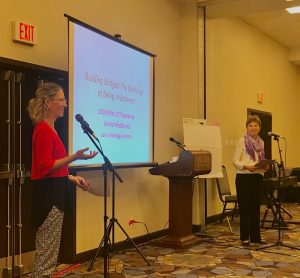 Kendra and I explained that we chose to take a feminist approach to our book Building Bridges, so this is not a traditional biography that spotlights one person. While Letha Dawson Scanzoni, one of the most important founders of Christian feminism, is certainly a worthy subject of such a book, her life suggests a different kind of approach. We decided that her story could be best understood by connecting it with the stories of those whom she has influenced and those who are continually being transformed by her life and work. Her story is a story of feminist collaboration. Her story is the story of EEWC-CFT. Her story is our story.
Kendra and I explained that we chose to take a feminist approach to our book Building Bridges, so this is not a traditional biography that spotlights one person. While Letha Dawson Scanzoni, one of the most important founders of Christian feminism, is certainly a worthy subject of such a book, her life suggests a different kind of approach. We decided that her story could be best understood by connecting it with the stories of those whom she has influenced and those who are continually being transformed by her life and work. Her story is a story of feminist collaboration. Her story is the story of EEWC-CFT. Her story is our story.
The title of our book comes from Letha’s work of building bridges to spread the good news of the liberating message of Jesus that includes all. To spread this good news she and her friends have built many bridges including:
between Christian feminism and the wider culture;
between evangelical and mainline Christians;
across genders and gender identities;
across races;
across sexual orientations;
across generations.
In the CFT Gathering presentation, Kendra and I highlighted Letha’s books All We’re Meant to Be (co-authored with Nancy Hardesty) and Is the Homosexual My Neighbor? (co-authored with Virginia Ramey Mollenkott) and her work with EEWC-CFT.
In All We’re Meant to Be, Letha and Nancy establish their methodology of biblical interpretation as christocentric, and focus on the historical and cultural context and on the major themes of the Bible. They acknowledge that they read through the lens of Jesus. In places where the Bible isn’t clear or contains contradictions, the person of Jesus takes precedence. Letha has been difficult for evangelicals to criticize for she remains steadfastly convinced of the centrality of Jesus. Because Letha and Nancy understood Jesus’ message as one of liberation, this key idea provides a focus through which to examine all questions. Historical and cultural contexts are necessary to understand a biblical passage within its time period, and studying them is not intended to reduce the value of the text (a key fear that still motivates critics today). Letha and Nancy claim we must know what something might have meant then in order to take seriously what it might mean today. Focusing on major themes guards from the fallacies of using a proof-text method. The liberating work of Jesus is the main theme Letha and Nancy use. So a passage like 1 Tim 2:11-12, that some people still quote to keep women from church leadership, must be examined in the light of Jesus’ liberating message and actions.
In the Introduction of their first edition of All We’re Meant to Be, Letha and Nancy write: “Women have just as much right as men to think of themselves in God’s image.” They provide substantial biblical support for their main theme: gender equality based on the divine image including female and male. First published in 1974, All We’re Meant to Be became an instant hit and received Eternity magazine’s Book of the Year award. Historian Pamela Cochran calls it “the most influential work in helping launch the evangelical feminist movement.” More rewarding than awards and accolades to Letha and Nancy were readers’ comments to them. They begin their third edition of this book by writing that over the past two decades since the first edition came out, hundreds of women and men across the country have walked up to them and said, “Your book changed my life!” All We’re Meant to Be and Letha’s other published work, her work through EEWC-CFT, and her mentoring continue to have transforming power. Building Bridges includes stories of a diverse group of people, drawn from interviews.
Here are some of the quotes we included in the Gathering presentation:
I was searching for something that would put the pieces together of a feminist biblical hermeneutic that spoke to the harmful biblical interpretations that I had grown up with in the church. All We’re Meant to Be is timeless in that it still actively stands against traditional evangelical interpretations of Scripture that unfortunately keep returning.— Jennifer Newman, 2014 Nancy A. Hardesty Memorial Scholarship recipient
Letha has given me strength to flex my muscles as a confident, strong African American woman. When I read All We’re Meant to Be, I could literally hear Letha’s voice and feel her passion, commitment, and wisdom. I found myself in the pages. I was affirmed as a single woman with a mission of social justice for all. —Leslie Harrison, womanist minister, EEWC-CFT Council member
All We’re Meant to Be inspired Kendra and me in our writing of If Eve Only Knew. The idea that has resonated with me most fully is the central claim that we are created to be all God means for us to be, and that we need to live fully into God’s calling, despite the many barriers placed in our way. —Melanie Springer Mock, English professor, author
In Is the Homosexual My Neighbor, first published in 1978, Letha and co-author Virginia Ramey Mollenkott also interpret Scripture through the lens of the liberating message of Jesus. They apply this liberating message not only to women but also to people who have been marginalized by church and society because of sexual orientation. Virginia gives credit to Letha for the title of the book: “Letha had come up with the title that made many anti-gay Christians angry because it tweaked their guilt over their judgmentalism.”
At the beginning of Is the Homosexual My Neighbor? Letha and Virginia write: “The question that makes up the title of this book shouldn’t be necessary. After all, Jesus made it clear that every person is our neighbor.” Jesus did not narrow the identity of our neighbor to geography, race, or religion but only to need. Letha and Virginia make the case that Jesus’ countercultural actions mean that in every instance where people are oppressed by social and faith-related structures, the work of justice must be done. Taking a stand for LGBTQ justice cost Letha the acceptance she had formerly enjoyed as a public figure within the evangelical community. Many people accused her of being on a “slippery slope” theologically. But she insisted that she was following Jesus’ commandment to “love your neighbor as yourself” (Matthew 22:39).
Letha and Virginia had the courage and compassion to write one of the first books by Christians that takes a positive stand for LGBTQ people. This book has been life-changing and life-saving for countless people.
This book was a gift, just a gift. It quite literally saved my life. —Elizabeth Kaeton, Episcopal priest, hospice chaplain, pastoral counselor
In no small part because of Letha Dawson Scanzoni, I’ve been able to express my sexuality in ways that are loving and life-affirming. —Jeff Lutes, former executive director of Soulforce
What allowed them to find the courage to write this book, even though they must have known most people would certainly not react favorably? I figure that Virginia must have been starting to understand this work was about her own life. But why would Letha do it? That, I think, sheds light on who Letha is. —Lē Weaver, EEWC-CFT’s Director of Public Information
At the Gathering we also highlighted Letha’s transformational work with EEWC-CFT. Letha did not start out to create an organization or a movement when she began writing about biblical feminism in the 1960s and ‘70s. Instead, she wrote to address the various ways women were oppressed by church leaders and theologians who made inaccurate assumptions about the Bible, and indeed about women. And yet, no one has had more influence on EEWC-CFT than Letha. Her steady leadership and guidance as well as her longtime editorial work on the organization’s newsletter (EEWC Update) and subsequent website have shaped the mission and function of the organization.
EEWC-CFT began as a women’s caucus formed within Evangelicals for Social Action (ESA) in 1974 to consider issues like the Equal Rights Amendment (ERA) and removing sexism from Christian education curricula. The following year this group, at that time called Evangelical Women’s Caucus (EWC), met on its own at a national conference in Washington, DC. At this and other conferences Letha gave plenary addresses, inspiring women to claim God’s call to fulfill their full potential, empowered by an outpouring of the Spirit to step out without fear. Between 1974 and 1978, the group solidified, forming local chapters and a national organization with a statement of faith, bylaws, and elected officers. The 1978 publication of Is the Homosexual My Neighbor? laid the foundation for the organization to vote at the conference in 1986 to take a stand for LGBTQ rights. Many people who opposed this prophetic stand left the organization to form Christians for Biblical Equality (CBE). Letha continued to guide EEWC-CFT as editor of publications and manager of online content. In 2014 she delivered another challenging plenary address, calling Christian feminists to reach across geographical and ideological boundaries and to become more aware of the intersectionality of all oppressions. It is this sense of an ever-widening circle of justice that punctuates Letha’s view of where EEWC-CFT has been and where it will go in the future.
Letha has continued to increase her connections with people of many generations, races, sexual orientations, and religious affiliations.
It is because of EEWC-CFT and women like Letha and Nancy that I can continue to question and critique documents and practices of faith, while still proclaiming myself to be a woman of faith. Their groundbreaking work and guidance empower new generations of Christian feminists to continue moving forward toward the goal of a truly holistic and equality based life for all people of faith.— Katie Deaver, 2015 Nancy A. Hardesty Memorial Scholarship recipient
All in the CFT family have welcomed me into their fold with open hearts and open minds. ‘Welcome’ is a good word to associate with CFT because this network of incredible people embodies the Feminine Divine as they foster space where those committed to equity and equality can find a space to belong. —Alicia Crosby, cofounder and executive director of the Center for Inclusivity
Now I know that I am not alone in my convictions and that feminists are diverse and dynamic. Feminism isn’t just a part of my life, but something that is woven into the character of who I am and has fundamentally changed how I think, feel, and relate to others. EEWC-CFT has aided in the stitching. —McKenzie Brown, CFT Gathering emcee
As WATER has grown more diverse, EEWC-CFT is a natural ally. I find EEWC-CFT to be a vital and welcome partner in the work of feminist, religiously rooted social change. Future scholars will comb the archives with excitement as they find the countless contributions that Letha has made to EEWC-CFT and the larger feminist religious community. —Mary E. Hunt, Catholic feminist theologian, cofounder and codirector of Women’s Alliance for Theology, Ethics, and Ritual (WATER)
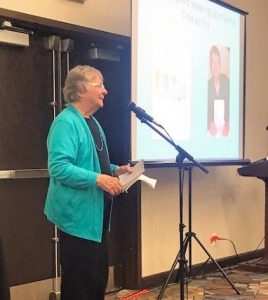
Letha concluded the presentation with words of wisdom and challenge.
She spoke about being a reluctant prophet and about feelings associated with following a prophetic call: “You feel terribly alone. But you feel the call. And you need to do it. You pray, ‘Give my courage. Save me from my fear.’ Often the prophet feels resistant and struggling. I particularly felt that when writing Is the Homosexual My Neighbor? But our loving Godde Sophia is with us. We are ALL called for such a time as this.”
The book Building Bridges, Letha said, is “about all of us.” She expressed gratitude for the book: “I’m grateful they wrote it or you wouldn’t have the story. But I like to think of it as OUR story together.”
The story began for her when she became “bothered by the limitations placed on women in the church.” She acknowledged the importance of timing: “I was the least person you could imagine as radical. First, there was the women’s movement, and then Stonewall. It’s about timing. This is your time now.”
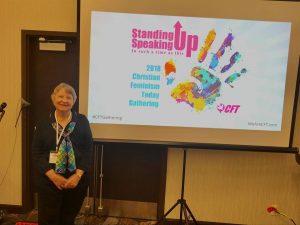 Letha challenged us all to find and follow our liberating call for such a time as this: “Ask yourself who you are meant to be. Think about it. Are you on the road for doing that? If not? Why? How can I help my neighbor? Each of us must ask ourselves this question. What is my responsibility to my neighbor?”
Letha challenged us all to find and follow our liberating call for such a time as this: “Ask yourself who you are meant to be. Think about it. Are you on the road for doing that? If not? Why? How can I help my neighbor? Each of us must ask ourselves this question. What is my responsibility to my neighbor?”
Thanks to Dr. Christy Sim for the photos from the Gathering.
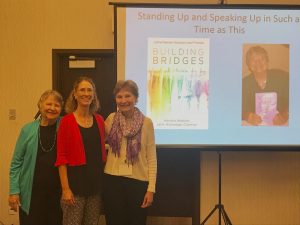
Thanks to you and Kendra and Letha for an awesome presentation that made history come alive! Thanks, too, for sharing this on the web as it’s bringing back the excitement and warm memories of the Gathering in St. Louis 🙂
Thank you, Deb, for your kind words. Thanks also to you and Mark for your amazing presentation! Yes, we can keep alive the excitement of the CFT Gathering!